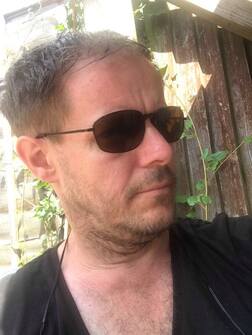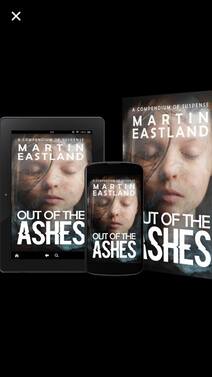 Author Martin Eastland Author Martin Eastland
WHAT GOT YOU STARTED AS A WRITER?
I remember as a child, although I had severe reading abilities, using a system called ITA, reading a lot of classic children’s books, leading to my spending a great deal of my childhood volunteering in the local public library, stacking books and issuing them in my later formative years. Hell, it was better than fighting or being at home! The main two books in my life were in 1986, both connected by sheer chance, and the ones that shaped my life from that point. Dracula (1897, Bram Stoker) and it’s protégé, Salem’s Lot (1975, Stephen King). Although the Stoker classic I had read in ‘children book’ format, I soon after read the unabridged adult version, which blew me away. But, it was the slow-burning, insidious drive of King’s second novel that made me love the written word so much that it made me a writer then and there. DO YOU RECALL YOUR FIRST ATTEMPTS AT WRITING? Like it was only yesterday. I was in my High School Library, and in the store room sat a heavy, metal manual typewriter from the 70’s or 80’s – the kind you could probably kill someone with should you need to throw it at them! I asked to try it out, and what followed still freaks me out to this day, 30 years on. It was run off like a demon in around 20 minutes, set in Hong Kong – somewhere I’d had only images of from movies – and used a lot of cinematic imagery, even then, at 12 years old, being very unusual. It was called Heart of the Orient. In more recent years, I used it as a scene in a screenplay called Gaijin. It remains unwritten as yet. The other key story was a mock preliminary English exam, called “The Night the House Fell Down”, based on only a photograph of a large farmhouse and a crumbled brick perimeter wall. I wrote my way to the best grade I had ever had in those days. Shame I didn’t think to repeat the feat for the actual exam held soon – not wasn't sure I was allowed to. WHAT GENRES DO YOU CONSIDER TO BE YOUR STRONGEST, AND WHY? If I’m going to be honest, I stick with what I know best, that being Suspense-Thriller and Suspense-Horror. They’re more fun to write and I get a kick out of scaring the crap out of people or giving them something to think about for the next few weeks. As to the “why” part, most assume I have a choice in it. It’s just the way it is, I guess. I do expand into other areas, but these two are where I do the most damage to my readers’ psychoses. WEAKEST? I would honestly have to cite Science-Fiction. Not that I don’t like it, but simply the fact that it never really bit me like Suspense and Horror did. No gifts in that area have made themselves apparent as yet. I’ll get there, though. I’m open to trying most things but my confidence lies in Suspense with occasional horror elements. WHAT GENRES WOULD YOU LIKE TO BE MORE EFFECTIVE IN? I’m a huge fan of James Clavell! Historical fiction is amazingly detailed and vast, and it’s an area I delve into now and then. His two novels – Shogun and Tai-Pan – were almost Victorian in diction, and the universes he placed his creations were rich and consuming. AS A WRITER, WHAT ARE YOUR MAIN STRENGTHS AND WEAKNESSES? This one’s fairly easy to nail. My best feature is my atmospheric description, maybe the general narrative flow (so I’m told, at least). My hopes are that my work imprints itself on my readers’ minds. As for weaknesses, I think I would have to say dialogue and complex grammatical issues. My English education at school was hopeless. We didn’t get grammar, composition, or what the hell a “floating gerundive” or a “split infinitive” is. I learned to write through reading novels from 11 years old and never looked back since. I feel that God has blessed me with an instinctual gift in writing, as the consolation prize for the less than harmonious childhood and adolescence I’ve had to endure all these years . . . but it’s [writing] always been there when I needed it to lose myself in. I owe it a great deal. HOW OFTEN DO YOU WRITE AS A RULE? I write every day, even if it’s only 2,000 words to get the feel for a new story. I work my way through it on an electric typewriter as I rattle it out as stream-of-consciousness or free-writing, getting my bearings. Then I transfer it to Word on my phone, and continue from there, if I feel it has legs to spend time on. I’ll generally work at night, into the small hours, as the kids are asleep and I can focus, but I often write at various stages through my day while kids are at school, when possible. WHAT IS THE WORST THING ABOUT THE PROCESS? I love the rush of getting a new idea, and rattling it out, destroying the smugness of the blank sheet of paper, infusing it with life. The worst part is not having my work be rejected – I couldn’t care less! The waiting is the worst part – both waiting for acceptance/rejection or for the publication date so I can get my hands on my copy (Laughs). When it’s accepted, it’s a sweeter feeling of achievement. I see you have a book of fiction coming out soon. Is that your first book? Tell us more about that publication. It’s a collection of short stories, titled Out of the Ashes, mainly, with a scattering of flash fiction pieces that I thought might be interesting sidelines on the human darkness aspect of our own duality, a much-secreted factor in our ‘make-up’ and themes which we enjoy in private in direct opposition to the carefully-packaged image we present to our peers. Sadly, concern for others’ perception of us limits our own development, and draws us further into the shadows. These stories, I believe, will cause people to re-examine themselves and look at life from a different vantage point. I’ve also included a small amount of extra bonus features for the readers to enjoy at the end. WHAT, IF ANY ADVICE, WOULD YOU OFFER A NEW WRITER? I don’t feel right offering advice at this juncture, but I will offer that writing can provide a deep satisfaction to your mental well-being, and it’s a lot of fun creating something out of nothing, even just a title. Grow a thick skin – you’re gonna need it! Don’t listen to anyone saying, “Get a real job!” If you’re getting withdrawal symptoms from not writing, you’re on the right track. With us, there is no choice. We have to write. Thank you for doing an interview with me! I hope to interview you in the future. Readers, you can learn more about Martin Eastland @ https://www.facebook.com/martin.eastlandking. |

